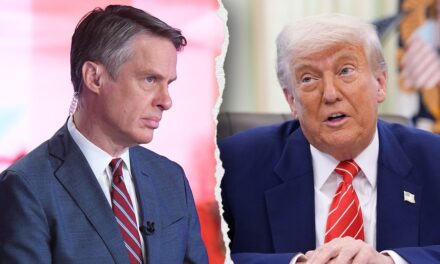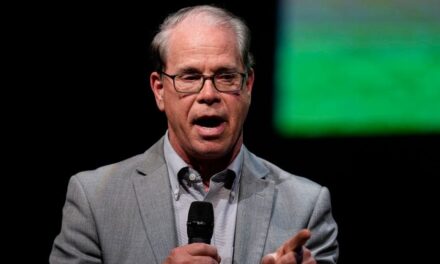In a significant move that has reverberated through the corridors of journalistic integrity, Fox News host Pete Hegseth has announced stricter credentialing protocols for the press corps at the Pentagon. This decision comes amid heightened sensitivities regarding national security and the protection of classified information, raising eyebrows in both media and governmental sectors.
The Pentagon, which has long served as a bastion of military and defense reporting, now finds itself at the center of a contentious debate over free press versus national security. Hegseth’s directive aims to ensure that only individuals with appropriate backgrounds and motives can access the sensitive information that is often disseminated within the Pentagon’s walls.
Pentagon press officials revealed that the adjustments in credentialing criteria are designed to filter out potential threats. These threats encompass not only foreign adversaries but also individuals whose intentions may not align with the mission of the Department of Defense. While maintaining the importance of a press free from undue influence, the Pentagon is taking a stand to bolster its security measures.
Reports have indicated that the criteria revisions will include more rigorous background checks, necessitating a more comprehensive vetting process for those seeking access to Pentagon briefings and events. The goal is to cultivate a correspondence with a press corps that can responsibly manage the sensitive information they’ll encounter while covering military and defense issues.
Hegseth’s initiatives are set against a backdrop where media professionals have claimed basic rights to cover the government adequately. Critics of the new protocols have raised concerns about the implications these changes could have on journalistic freedom and the public’s right to know. Some advocates fear such measures could lead to a chilling effect on the press, driving away journalists who could provide necessary oversight on government actions.
In response to the changes, Hegseth defended the decision, stating that national security must remain a top priority amid increasing global tensions. “We cannot allow our adversaries to exploit vulnerabilities within our press systems,” he asserted, underscoring that the intent of these new regulations is to ensure the safety and integrity of classified information as well as the personnel who work at the Pentagon.
The Hegseth-recommended changes are also viewed within a broader context of the evolving relationship between the media and governmental institutions. With the Biden administration’s own efforts to establish clearer communication lines with the press, the Pentagon’s actions come as a juxtaposition that raises questions about how far security interests should extend into the realm of press freedoms.
As some journalists voice their unease over the new credentialing process, others have begun to adapt, viewing it as a legislative challenge to engage in more thorough narratives while respecting national security concerns. Media experts argue that the balancing act between national security and journalistic rights must not tip too far in one direction.
The Pentagon has maintained that their goal is not to stifle journalistic effort, but rather to create a more secure environment during periods of increasing military engagement across the globe. In a world where misinformation can sway public opinion and affect military operations, the Pentagon has felt compelled to take proactive steps to navigate the tightrope of security and transparency.
Government officials emphasize the importance of continuing to convey critical information to the public. Yet they also acknowledge that certain procedural adjustments may be necessary at this time. Hegseth’s directive comes in the wake of a series of security breaches that have challenged the Pentagon’s defenses, highlighting vulnerabilities that need addressing.
Critics of the new credential requirements draw parallels to past administrations that also modified press access amid national threats, viewing Hegseth’s directive as part of a continuation of an alarming trend. Those concerned about the erosion of press freedoms argue that maintaining governmental transparency is integral to democracy, especially regarding military actions and defense strategies.
The editorial board of a leading news publication has published an open letter expressing their concerns about the ramifications of the new measures. They point out the importance of monitoring government power and the potential consequences of running the risk of an insulated media environment devoid of scrutiny and accountability. “A free press is an essential check on the powers of the state, especially when it comes to matters of national defense,” the letter stated.
As the debate heats up, both the Pentagon and media institutions must grapple with a shared responsibility to protect the public interest. While Hegseth’s new protocols aim to enhance security validity, they also provoke deeper discussions about the extent to which press freedoms should be curtailed, even in the name of national security.
The Pentagon’s communications team is operating under the belief that these new regulations are a necessity for today’s security landscape. Their stance is underlined by the necessity to proactively address vulnerabilities without disregarding the fundamental information journalism can provide in the realm of public discourse.
The future will tell whether these protocol modifications will lead to more severe restrictions or if they’ll land as temporary adjustments reflecting the current climate. How the media reacts and adapts to these changes will likely shape the narrative surrounding the relationship between the Pentagon and the press corps for years to come.
As American society navigates the complexities of national security in a post-pandemic world, the interlinkage of media freedom and governmental safeguards becomes all the more vital. The quest for a balance between these two domains remains ongoing and critical.
Ultimately, how Hegseth’s directive shapes the landscape of military journalism will echo through future coverage of U.S. defense issues, underscoring how easily the scales of national security and press freedom can shift in an unpredictable global sphere. Journalists have a responsibility to continue fostering a dialogue about these concerns as they strive to navigate the challenges of reporting in an environment increasingly marked by security stipulations.
The conversation about the future of press credentials at the Pentagon has only begun. It’s essential that journalists actively engage with these changes while remaining vigilant stewards of information that the public relies on, ensuring that, above all, the imperative to inform does not succumb to the pressure of secrecy in the name of national interest.
































